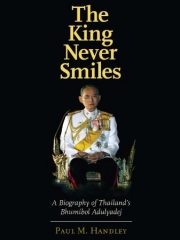The King Never Smiles by Paul Handley
It’s been a very busy start to the new job. I wrapped up this book during onboarding week but haven’t had a chance to do a writeup until Christmas holidays. Things are getting better though, so hopefully I’ll be able to keep up regularly. As for this book, I’m playing catchup for all the countries I visited last year in Asia. It’s been tough to find books on these places. Most are either travel guides or very dry-looking historical walkthroughs. Maybe the market for contemporary narratives on specific Asian countries is just too small. Add on the fact that most of the books that fit these criteria are written by western professors/journalists (including this one), and it’s very slim pickings if I want an authentic, well-research portrayal of, say, modern Cambodia. That said, the whole premise of this book is that a local author wouldn’t have been able to tell the truth. So I’ll take what I can – I’m sure this won’t be the last book I read about the Thai monarchy, at the very least to understand both sides of the story.
1) The past decade of Thai politics has been centered around Bhumibol’s succession.
The author’s central thesis is that the elite class has the real power in Thailand, and their goal is to put in place a monarch they can control. Between the monarchy, the army, and a small group of elites, the monarchy has the least power and serves mostly as a figurehead.
2) Under Thailand’s lese-majeste law, people can be put in jail for 3-15 years for insulting royalty.
From what I’ve seen inside and outside of Asia, Thailand has some of the best PR in the world. It’s mostly associated with beaches, cheap food, massage, but then there’s a law like this.
3) Bhumibol’s birthday is Father’s Day, and Queen Sirikit’s birthday is Mother’s Day.
Having grown up in Hong Kong and America – places where government leaders are constantly ridiculed, it’s hard to imagine a population that reveres its leader.
4) The combination of Hinduism and Buddhism strengthens the king’s claim to legitimacy.
I don’t think the author made a great argument here, and I also don’t understand religious concepts very well. His hypothesis is that in Hinduism, one’s greatness comes from blood. In Buddhism, it comes from merit. Apparently, in Thailand, the king is legitimized because he had obviously achieved great things in a previous life and was thus born into royalty. OK.
5) Zomia is a region covering parts of Southeast Asia and India whose people remain largely ungoverned.
The designation seems a bit superfluous, but the concept of ungoverned people is under-discussed – probably because discussion would lead to governance.
6) The Ayutthaya kingdom and the early Bangkok kingdom (ancestors of the ruling dynasty today) used a sakdina point system. For example, testimonies were weighed by the person’s points.
China is rumored to implement a social credit system, and if I had to bet based on my experience in Beijing, people won’t be opposed. And at its core, it’s really not that different from other systems of merit score keeping like education and income.
7) Bhumibol ascended to the throne when his brother was shot in the head in 1946.
I wonder if mysteries like this could still happen today, or are we too technologically advanced? Yes, the truth is what people believe, so I guess it’s a moot point.
8) Bhumibol built his image through Royal Projects trips to rural Thailand.
I remember watching a glowing documentary on a Thai Airways flight that showed the king solving irrigation problems in the countryside. By the way, Thai Airways is solid.
9) Thaksin dominated Thai politics in the mid-2000s by winning over the rural population.
His rise led to the yellow shirt-red shirt divide. He’s also another prominent example of rich businessmen who appeal to the poor. I really don’t understand how this concept works.
10) Princess Sirindhorn is popular amongst the Thai people but probably never seriously had a chance to become the monarch.
This saga reads like a movie plot.
The king’s influence was real. When he passed away, my coworkers on Thai projects had days off, and every Thai person I knew on Facebook posted or updated their profile pictures. During my visits to Thailand last year – the year of mourning, there were huge portraits of Bhumibol everywhere. We’ll see what happens in Thai politics over the next few years. From an economic perspective, Thailand seems to punch below its weight for now. I’m very bullish on SE Asia as a region, and Thailand needs to step up if it doesn’t want to be overshadowed by its neighbors.
